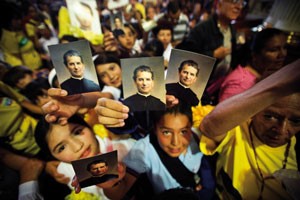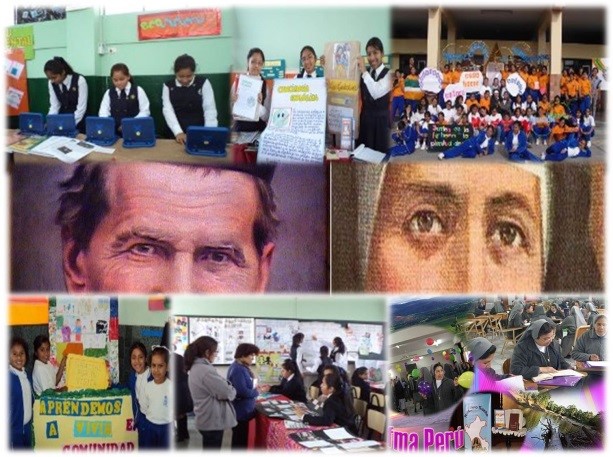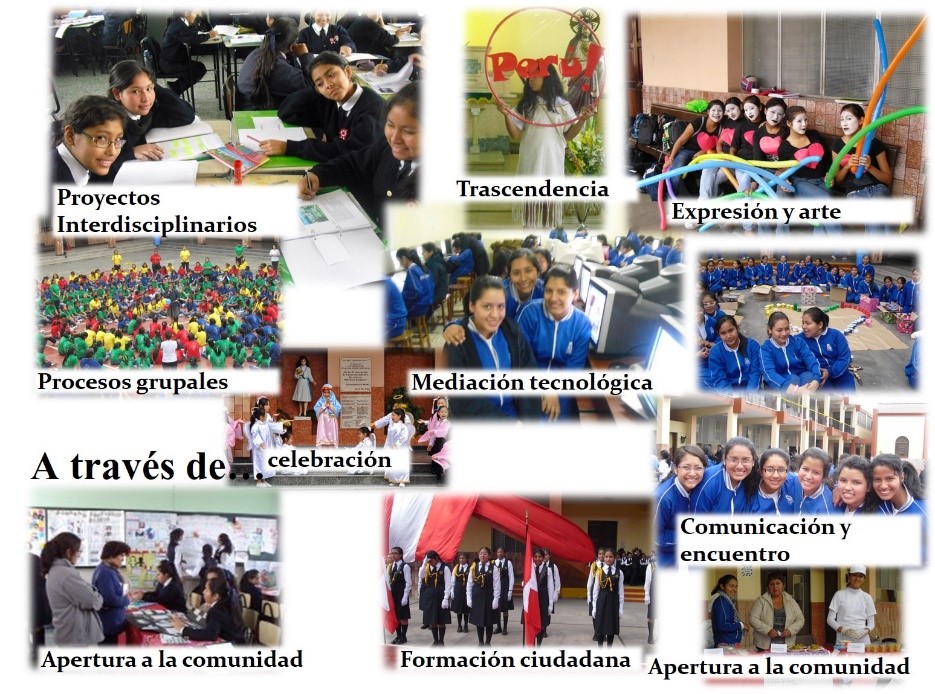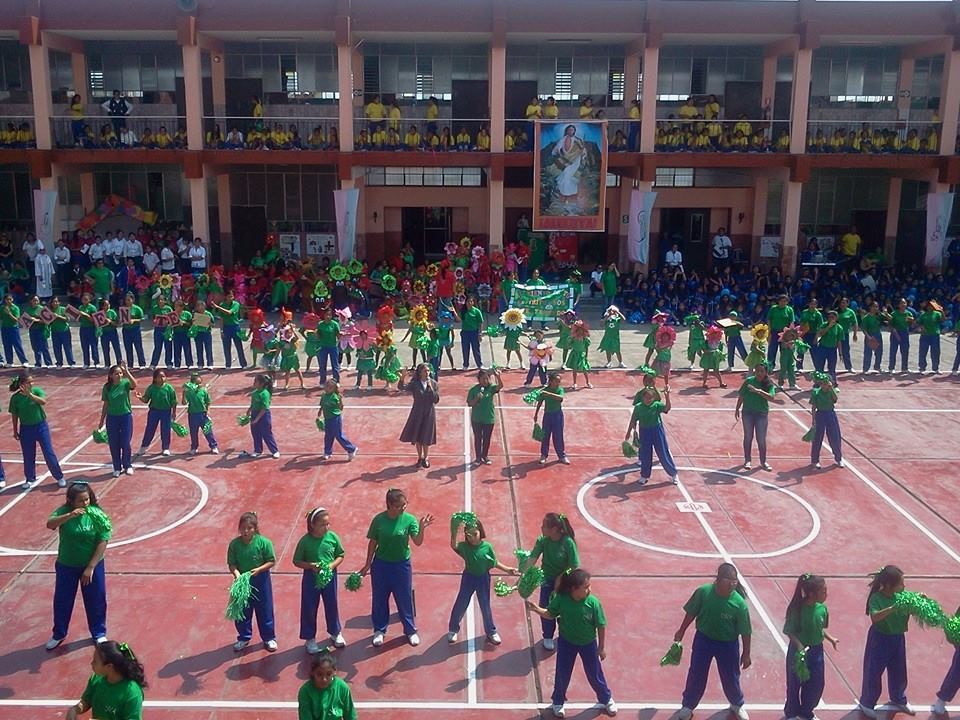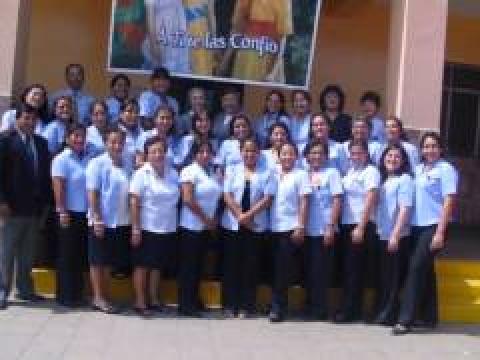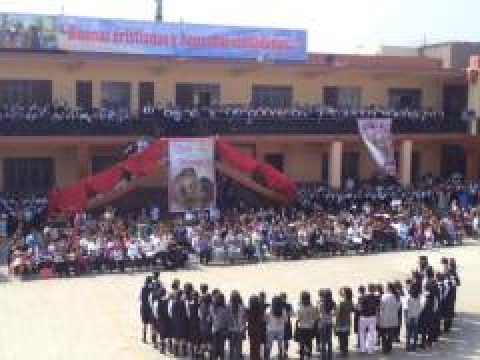Communication Pedagogy / SALESIAN SCHOOL HOUSE THAT EDUCATES, COMMUNICATES, EVANGELIZES
General purpose:
- To favor the integral development of girls and adolescents in vulnerable situations that ensure the significance of the educommunicative proposal in their lives, integrating all the dimensions of their personal being from the application of educommunicational praxis in the school that educates, communicates and evangelizes, ensuring the formation of good Christians and honest citizens for a new society that transforms scenarios and promotes the meeting.
Specific objectives:
- Recognize and value educational communication processes that ensure a better communication quality in the educational experience.
- Apply the teaching of educommunication in the learning process from the collaborative and transversal methodology that ensures better dignity and self-esteem.
- Evidence the importance of open, democratic and circular communication processes in the educational experience.
- Promote the development of authentic educommunication ecosystems in educational practice.
- Exercise of leadership and social skills that promote the formation of Christians committed to their social environment.
- Apply the technological platform as a valid means of communication and evangelization in the educational process.
- Conscious and responsible commitment to the local Church that makes them credible social partners
The Joint Action School by Convention 0001 "Mary Help of Christians" is a meaningful Catholic educational option that shapes for life in a complex society. With the original contribution of the Salesian Preventive System: Reason, religion and love, they educate children and youth most in need so that they exercise their leadership as citizens who bravely and coherently face the challenges of a changing world.
Recognizing the potentialities found in girls and adolescents in the slum area of the capital of the Republic, we are committed to launching a significant contemporary methodological experience, attractive and open to the realities of vulnerable girls and adolescents, an educational communication experience which is based on communication that educates, and a communicative action that evangelizes,
As well as in the encounter with Jesus that strengthens the experience of working together, favoring the development of credible social partners.
From the application of this experience in the educational process, it is intended to develop a collaborative educommunicational methodology, from the logic of the processes, which transforms contexts and scenarios, which takes into account the application of new youth languages in the educational experience in order to get involved in the experience of girls and young people, which favors the formation of a meaningful evangelical citizenship in the contexts in which they are developed.
The educommunicational experience in this educational community dates back to 2006, as a courageous option for the Entity promoting the Daughters of Mary Help of Christians to close a Private School on the outskirts of Lima that did not respond to the current needs of the area and the opening of a public school with all the challenges that this option brings.
It is a school designed for vulnerable girls and adolescents that is located in a marginal urban area of the capital of the Republic, very poor and shady, drug trafficking area, trafficking in whites and family abandonment, racial discrimination and domestic violence.
Therefore the cultural level is poor and influenced by fashion, superficiality, noise, technology, that is, the postmodernist experience of a culture that is submerged in the fragility of identity, citizen commitment, search for the common good, and forms of expression that escape from the traditional communicative contexts in the field of education, as a consequence of the complex sociocultural reality in which it develops.
The scenarios in which they grow, directly affect girls and young people who are looking for ways to evade reality by increasing an invasive mentality of consumption, thoughtlessness, few criteria in media management, significant learning experiences, effective communication, as well as submission and indifference to the possibility of new proposals, as well as the explicit lack of training in critical thinking, the relationship with the other, the self-assessment as a person of rights, the approach to the construction of knowledge, lead to a pessimistic and impossible attitude interpersonal relationships, social skills, and social commitment.
Faced with the reality described in the context, the religious community, together with the teaching community, takes on the challenge of formulating, applying, monitoring and evaluating an innovative educational proposal that favors communication, dialogue and encounters that values differences, in three fundamental nuclei that have to do with:
- Organizational culture
- Communicational culture
- Integrative educommunicational methodological proposal.
The convergence of these three dimensions ensure that the educational style will make possible the formation of integrated people, with the possibility of success and development, capable of assuming the social commitment by which they are known as interlocutors of change that transform the environment.
The pedagogy of communication will be the vital style of circular, interdisciplinary relationships that will permeate the environment, making possible the development of open, assertive and democratic educommunication ecosystems.
- Organizational culture:
When confirming this reality in its manifestations and socio-cultural realities, we proceeded to recognize the shortcomings and needs with the various strata of the educational community, groups of reflection and educational-communication training were formed, a team mentality and network work were generated, from the diversity of technological, experiential and collaborative work strategies.
The style of communication in educational management was gradually built up, involving, articulating and betting on dialogue, to all the members in a co-responsible manner. Time was spent listening, circular dialogue, respect for differences, the evaluation culture was also very important in the organization, which allows flexibility of options according to emerging needs.
The organizational culture favored the integrative development of the Pastoral Dimension, soul of the educational proposal, it was revitalized from the technological, artistic and expression platform in innovative ways, integrating them within the learning process itself.
In this way, a collective awareness was created that everything has a reason for being and that the person is one, thus promoting social responsibility, solidarity, and peaceful and concerted coexistence. Special care was taken to ensure the quality of evangelizing experiences that prioritize giving from poverty itself; for this reason the school keeps "the doors open to the neighborhood".
The insertion in the digital culture from the organizational culture favored the significance of the educational experience and the constant effort to build communicative ecosystems with educational intent.
- Communicational Culture
The communicational processes within the educational proposal are prioritized from circularity, respect for differences, reciprocity, listening and dialogue, cultivating critical and reflective thinking, in a conscious and flexible way. In this way, the family climate is fostered, which revitalizes environmental pedagogy and makes it possible to humanize relationships by creating
true edu-communication ecosystems.
The communicational processes privileged the communicative action and respected the differences, favored the development of social commitment, serene self-esteem and institutional identity
The social sphere from the communicational culture, was a reason for continuous reflection and discernment from the educational community because it required the continuous exercise of humanization and
dignity of history itself, generating interdisciplinary projects, solidarity campaigns, awareness campaigns for peace, justice, order and equity.
In this sense, the Social Doctrine of the Church became an obligatory foundation for the work of the various areas of learning. Likewise, the social dimension in this proposal prioritizes networking, welcoming the various institutions found in the environment, the national police, the municipality, the women's ministry, the judiciary, the ombudsman's office, the ombudsman's office. child and adolescent, the Ministry of education the Ministry of labor.
- Methodological proposal:
A network of experiences is generated that respect the processes in progress as well as the learning rhythms and the capacity for social relations, prioritizing work in workshops, round tables, seminars, conversations, strategic alliances, all experiences integrated into the educational process.
They choose to exercise social skills from the team mentality that transcends the borders of sections, grades, increases citizen commitment and learns to take care of each other. Integrating the areas of educommunicational intervention in the educational process.
Although the four areas of educommunicational intervention are worked on throughout the experience, it is necessary to specify:
- Educate for communication (learn to live together).
Developing cross-sectionally in girls and adolescents: Communication skills such as listening, dialogue and reflection for joint decision-making based on the experience of teamwork, respecting individuality and enriching the diverse, from metacognitive evaluation, the formation of critical thinking, recognition of the value of teamwork.
- Expression and arts (learning to learn) .-
The human being always expresses his being and his thought through art and the diversity of manifestations, that is why he develops: The exercise of the practice of creativity, imagination, artistic expressions, verbal, non-verbal, enriching differences and strengthening innovation in the integrative learning experience: expression, art, theater, oratory, mime, journalism, educommunication, leadership workshops.
- Communication for significance:
- Communication with God (learning to be) .- Humanizing and strengthening the dialogical capacity of girls and young people through dialogue, reflection and foundation of the Church's social doctrine in the field of youth culture. Coexistence, days, celebrations of the word, personal dialogue, accompaniment.
- Technological mediation (learning to do)
Understand the procedures and reflect on the presence of multiple uses of new information technologies in education in a clear, dynamic, meaningful and assertive way in the educational experience. Technological mediation has generated a greater significance of the educational proposal, from the collaborative construction, blog, wikis, facebook, videos, virtual magazines, etc. - Methodology: strategies, techniques
- Citizen commitment
Worked from the application of interdisciplinary projects that favored the development of citizen identity and community membership, in cleaning campaigns, expression and urban art, educational fairs, student leadership, among others.
EDUCOMMUNICATIVE LEARNING STRATEGIES:
- Development of communication skills: listening, dialogue, deciding.
- Favor interpersonal dialogue.
- Conscious exercise of recognizing the value of differences
- Respect the differences that favor the diversity of characters in group dynamics.
- Assertive and critical application of Tics in the learning process.
- Assertive interpersonal and interpersonal communication.
ATTITUDES AND SOCIAL SKILLS INVOLVED:
- Hear
- Collect information online
- Follow instructions with a sense of belonging
- Understand the feelings of others
- Help others, get out of the world
- Avoid problems with others in openness to dialogue
- Make collaborative decisions with the common good in mind
- Exercise in conflict management
- Identify and value their own skills, recognizing and welcoming that of others
In this way, at the beginning of each year, since 2006, we have met with the teaching and lay community, reflecting and enriching ourselves with educommunication as a methodology that revitalizes the Salesian Preventive System, and we are committed to: - Assertive, open and flexible communication processes.
- Conscious exercise of social skills
- Cross-sectional collaborative methodology in the educational experience
- Meeting spaces and construction of inclusive learning, strengthening interpersonal relationships,
- networking.
- Application of the diversity of technological platforms in the pastoral educational process.
- Assessment of processes on products or results of experiences.
- Experience of interdisciplinary projects at the Institutional level in pastoral, pedagogical, and institutional management.
- Planning, execution and evaluation of the annual educational experience in the experience of one of the areas of educommunicational intervention that integrates the others. - Spaces of youth protagonism and peaceful coexistence:
- Coexistence, youth meetings, days of reflection, assembly of classrooms
- Construction of communication ecosystems that qualitatively improve the quality of the training process as well as the encounter with Jesus incarnated in history, in solidarity with his people.
- Solidarity commitment to share: the bread of the word with children and adolescents from the environment as well as solidarity campaigns with which Easter, Christmas and a diversity of experiences born in the historical evolution in which we find ourselves have been celebrated.
- We managed to discover the face of God in the daily life of the educational experience.
- They learn to get out of themselves and discover communication from the "proximity" in the encounter with others.
- They like the investigative processes and recognize in the new communicative languages the possibility of growing as citizens of the world with a national identity.
- Recognize the technological platform as an ally in the new communication transits through which they walk, to explore, encourage, accompany.
- Assertive, responsible and enthusiastic participation in diverse experiences such as: student leadership of the Cercado de Lima, through the School District Municipality, active and constant presence in the participatory budget of the Metropolitan Municipality, talks on child abuse, white trafficking and human rights promoted by the women's ministry, presentation of collaborative projects open to the local community that seek the common good in the area, in network with the female police, the Metropolitan Municipality of Lima, the prosecution, the Ministry of Education, the ombudsman's office town, among others.
- With each girl, adolescent and family that arrives, warm and rich relationships are built in humanity that are shared in the educational community and generate proactive interactions of welcome and respect for diversity, acting with patience, without decay, looking with great hope at the personal and community walk.
- Religious and secular educators believe in processes, we respect the rhythms of growth and we know how to look with hope, because life is accompanied and it is sacred and dynamic.
- They all want to be respected and helped, none excluded or marginalized due to their social status. So they are ready to report all mistreatment.
- In this educational community the urgency of treating with respect and kindness is learned or it does not fit. Gospel and reason or you are not significant. It is not worth what you say if you are far away. Either you are good or why be here?
- Networks are created that favor reception and serene dialogue in which you can find expressions such as "Thank you for listening to me" ... and you have done nothing but look and welcome and bless and illuminate so that with new strength they study, appreciate, work and stay happy in life because God loves you and works wonders in each one.
- The collaborative methodology transcends borders and becomes a style of relationship and mutual aid in search of the common good.




